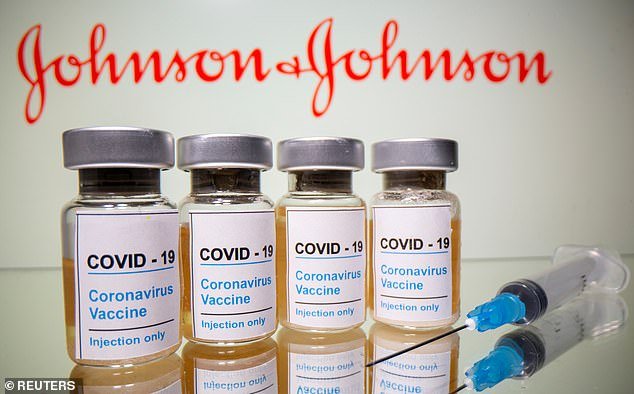US regulators suspend use of Johnson & Johnson’s Covid vaccine over blood clot fears – with UK set to approve the single-dose jab ‘within days’ and start supply of 30million in summer
- UK expects deliveries in the second half of 2021, with approval likely this week
- Johnson & Johnson’s jab is the only one-dose vaccine being used so far
- It works in a similar way to AstraZeneca’s, also embroiled in blood clot concerns
- Both use an adenovirus to transport part of the coronavirus into the body
Covid vaccine blood clot fears have struck a second jab as the US today stopped using the Johnson & Johnson shot which the UK may approve within days.
The Food and Drug Administration (FDA) has called for use of the jab to be suspended after six young women developed blood clots after receiving it.
British vaccine regulators are expected to green-light the pioneering one-shot vaccine this week and to start receiving deliveries in the summer.
The UK has ordered 30million doses of the jab, which would be enough to immunise more than half of the adult population.
However, they are not expected to be available until the second half of 2021, by which time most adults will have been vaccinated with a different jab and many of Johnson & Johnson’s will likely be surplus.
Around seven million people in the US have already been given the vaccine. It is one of three being used there, with 98million people given Pfizer’s and 85m given Moderna’s.
The six women who developed clots – representing a rate of around one in a million – were aged between 18 and 48; one of them died and another is in hospital, the New York Times reports.
On Twitter the FDA said: ‘ We are recommending a pause in the use of this vaccine out of an abundance of caution… Right now, these adverse events appear to be extremely rare.’
The news makes Johnson & Johnson’s vaccine – made by a Belgian subsidiary called Janssen – the second to become embroiled in a blood clot scare.
Countries in Europe, including the UK, have stopped giving the AstraZeneca vaccine to young people because of concerns it might increase the likelihood of a rare type of brain blood clot that can trigger strokes.
The news makes Johnson & Johnson’s vaccine – made by a Belgian subsidiary called Janssen – the second to become embroiled in a blood clot scare after European countries stopped using the AstraZeneca jab for the same reason
The FDA can’t force doctors to stop using the vaccine without stripping it of official approval, which it hasn’t done, so the decisions will be made by individual states.
Its decision will not affect the UK’s vaccine rollout for now because the Johnson & Johnson jab has not yet been approved by regulators or put into use.
The MHRA, Britain’s drug regulator, is expected to issue a decision this week on whether the vaccine should be used.
If it gives the green light, the UK Government can buy 30million doses of the jab, which would be enough to vaccinate the same number of people. Unlike other vaccines, only one dose is needed to protect people from Covid.
Announcing its decision on Twitter, the FDA – which has the same role as the MHRA in the UK – said: ‘Today FDA and CDC issued a statement regarding the Johnson & Johnson Covid-19 vaccine.
‘We are recommending a pause in the use of this vaccine out of an abundance of caution.
‘As of [April 12], 6.8m+ doses of the J&J vaccine have been administered in the US. CDC & FDA are reviewing data involving 6 reported US cases of a rare & severe type of blood clot in individuals after receiving the vaccine.
‘Right now, these adverse events appear to be extremely rare.
‘Treatment of this specific type of blood clot is different from the treatment that might typically be administered.
CDC will convene a meeting of the Advisory Committee on Immunization Practices (ACIP) on Wednesday to further review these cases and assess their potential significance. FDA will review that analysis as it also investigates these cases.
‘Until that process is complete, we are recommending this pause. This is important to ensure that the health care provider community is aware of the potential for these adverse events and can plan due to the unique treatment required with this type of blood clot.’
